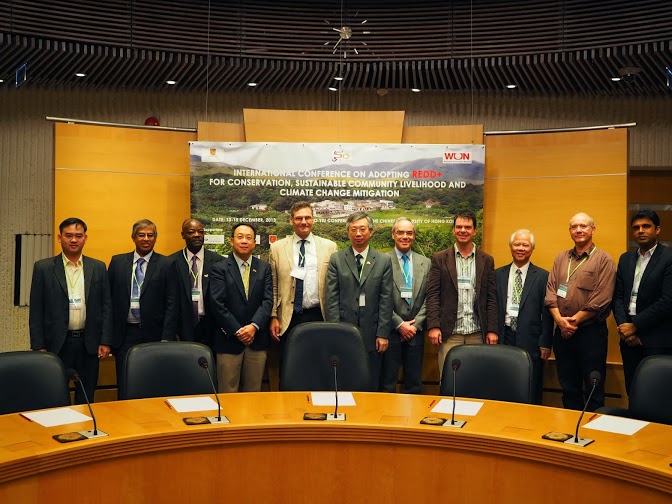Can REDD+ Achieve Conservation, Livelihoods and Climate Change Mitigation Goals?
By John Parrotta (Deputy Coordinator, IUFRO Division 8) and Lawal Marafa (Chair of the Conference Organizing Committee)
Dealing with uncertainties
REDD+ (reducing greenhouse gas emissions from deforestation and forest degradation, and enhancing forest carbon stocks in developing countries) is an evolving mechanism for climate change mitigation under continued debate within and outside of the UN Framework Convention on Climate Change (UNFCCC). While it has the potential to realize its primary climate change mitigation objective, there is considerable uncertainty regarding its actual or potential impacts on biodiversity, forests and the livelihoods of people in the tropical and sub-tropical forested landscapes where REDD+ implementation is envisaged.
IUCN Campaign – Plant a Pledge
IUCN has launched a campaign, « Plant a Pledge » , and is asking readers to sign the petition at www.plantapledge.com. It takes just a minute of your time!
IUCN is hoping that you will help the campaign by reaching out as widely as possible, by helping to promote the campaign through your networks, through publicising it through the web, social media, presentations and word of mouth.
Plant a Pledge – www.plantapledge.com – is an opportunity for the global public to tell world leaders and land owners that they support the goal to restore 150 million hectares of degraded and deforested lands by the year 2020. The goal is an implementation vehicle for achieving CBD Aichi Target 15 and has become known as the “Bonn Challenge” after it was launched in Bonn, Germany, in September 2011.
The Bonn Challenge target to restore 150 million hectares by 2020 came second when over 1 million people took part in the on-line public Rio Dialogue vote for the most important global recommendation during the recent UN summit in Brazil, “Rio+20”.
Restoring 150 million hectares would inject billions of new dollars into economies every year, and would significantly help mitigate climate change, boost biodiversity and reduce poverty.
The Plant a Pledge petition will gather the signatures from people across the globe, and will be personally delivered by our Ambassador Bianca Jagger to senior delegates at an upcoming high level international meeting, urging land owners and governments to dedicate land to landscape restoration.
Help gather enough signatures to really turn the heads of those leaders and convince them to commit to the Bonn Challenge.
The website www.plantapledge.com will give you lots more information on the campaign and on forest landscape restoration.
Please go there now and sign the petition and urge all your friends, contacts and networks to do the same, by forwarding this message, and ideally also by sharing it through other means.
If you have time to explore the site, you might like to watch the videos, explore the interactive restoration globe, read the case studies and learn more about the issue and the campaign.
Other things you can do to support this important campaign are:
– follow the campaign on twitter: http://twitter.com/PlantAPledge
– ‘like’ the campaign on facebook: http://www.facebook.com/plantapledge
– Tell all your friends, colleagues and networks and ask them to sign, too!
Thank you for your support!
Forests are a Path to Sustainable Development
13 May 2011, New York – As discussions draw to a close at the UN Commission on Sustainable Development (CSD) in UN Headquarters this week, members of the Collaborative Partnership on Forests (CPF), an international mechanism composed of 14-forest related organizations and secretariats, are calling upon countries to pay more attention to the crucial contribution of forests to sustainable development.
Members of the CPF are working to improve management, conservation and sustainable development of all types of forests. Sustainably managed forests contribute directly to poverty reduction by providing jobs, incomes, and consumable goods for poor families.
“At a time when we are faced with environmental, social, and economic crises that are daunting; the CPF is working intensively together to further catalyze the positive contributions of forests, including the livelihoods of forest-dependent people, as is being celebrated in 2011, the International Year of Forests.” says Jan McAlpine, Director of the United Nations Forum on Forests Secretariat. “Forest services and benefits are multifaceted and wide-ranging, from the environmental contributions to the social and economic. Cross-sectoral and cross-institutional cooperation and a people-relevant approach is vital not only to management of forests but for advancing sustainable development around the world.”
“Further analysis is needed during the International Year of Forests, to emphasize the connection between people and forests, and the benefits that can accrue when forests are managed by local people in sustainable and innovative ways” says Eduardo Rojas-Briales Assistant Director-General of the FAO Forestry Department. “Together we must continue to pursue multiple pathways towards sustainable development using forests at all levels.”
Rojas called attention to the 2011 edition of FAO’s State of the World’s Forests, which provides an analysis of how forests support people’s livelihoods and the development of sustainable forest industries. According to the report, forest industries are improving resource efficiency and recycling efforts and are making progress in promoting wood products as more environmentally friendly than alternative materials. Moreover, State of the World’s Forests 2011 indicates that community-based and traditional knowledge forest management approaches can help communities harvest and sell non-wood forest products to create more sustainable livelihoods.
The relevance of traditional forest-related knowledge and practices to global efforts to advance sustainable forest management, biodiversity conservation, adaptation to environmental change, and livelihood security is highlighted by a 6-year global study that has recently been completed by the International Union of Forest Research Organizations.
Emmanuel Ze Meka, Executive Director of the International Tropical Timber Organization noted that “Already in many tropical countries, sustainably managed forests and the products that arise from them are contributing to sustainable development at both the national and especially at the community level. But since sustainably managed forests still make up less than 10% of the total global tropical forest area, they clearly have the potential to play a much bigger role.”
A successful example of sustainable forest management can been seen in Guinea, where the Landscape Management for Improved Livelihoods (LAMIL) project by the World Agroforestry Centre and the Centre for International Forestry Research has had a profound influence on the sustainability of four large forest areas. Prior to the project, local people were forbidden from using the forest resources and illegal logging, poaching and land clearance were leading to forest loss. The LAMIL project developed a system of co-management involving local communities and government where the local people derive real benefits from the forests, and in return have shown their willingness and ability to manage them sustainably.
“The project illustrates how changes in how forests are governed can lead to win-win outcomes for forests and people,” commented Frances Seymour, Director General of the Center for International Forestry Research. “This project has done much to improve the welfare of the local people,” said Dennis Garrity Director General of the World Agroforestry Center. “It has also shown that sustainable forest management and improved livelihoods are inextricably linked.”
“Forests, soils and water are a trilogy that are not stand-alone, self-sustaining resources” says Luc Gnacadja, Executive Secretary of the United Nations Convention to Combat Desertification. “To foster a holistic approach to the management of these environmental resources, we must attend to three things. First, we need to focus on the causes, not the symptoms of deforestation. Second, we also need to focus on the soil, which is the real source of life for the land. Third, the communities that maintain the ecosystems we depend upon need to be rewarded.”
At the recent United Nations Forum on Forests (UNFF) meeting in February, ministers and high officials agreed on a Ministerial Declaration which stresses that “forests are an integral part of the global environment and human well-being, providing multiple goods and services essential for people worldwide and crucial for sustainable development and the achievement of the internationally agreed development goals, including the Millennium Development Goals.” The UNFF Ministerial Declaration contains the most important global forest policy issues and concerns as the concrete input on forests to the upcomingRio+20 conference. Rio+20 (June 2012), marks the twentieth anniversary of the adoption of Agenda 21, the blueprint for sustainable development, agreed upon at the 1992 United Nations Conference on Environment and Development. The conference will review progress made towards sustainable development and map out future strategies to address sustainable development and environmental challenges.
For more information:
Gerda Wolfrum, wolfrum(at)iufro.org, International Union of Forest Research Organizations (IUFRO)


